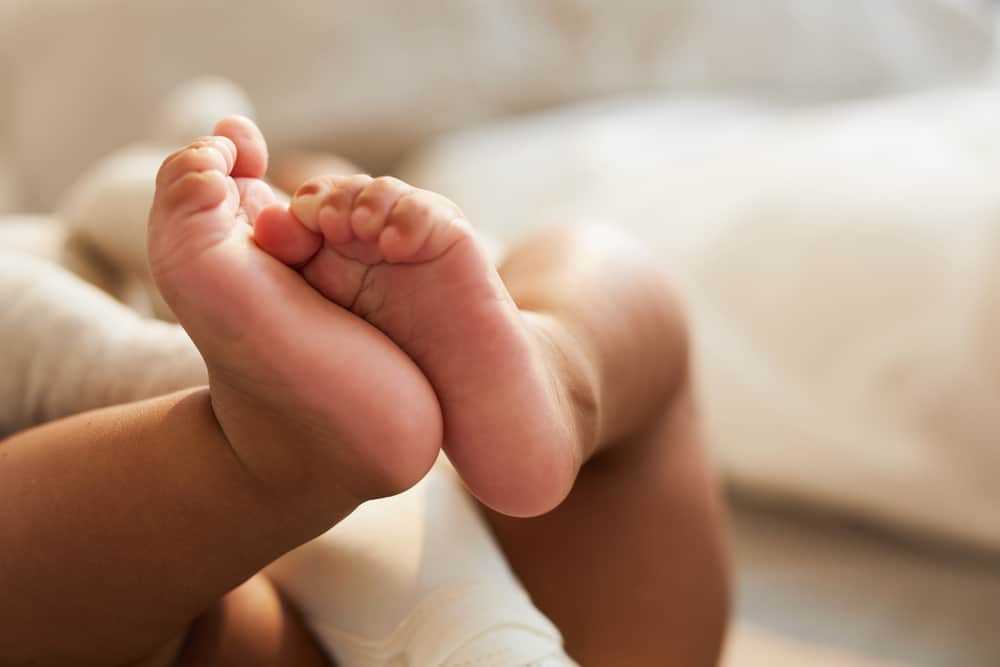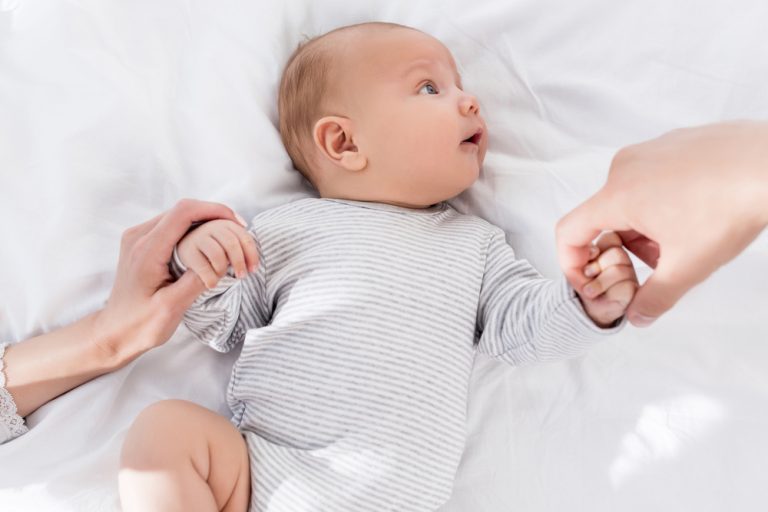Jitters, shivers, and shakes in newborns are very common, and they will freak out the majority of parents at some point. They’re usually just a sign of your baby’s nervous system developing and them adapting to life on the outside. Babies can even get the shakes if you drink too much coffee. Provided you’re breastfeeding, of course, they’re not THAT sensitive!
However, tremors can also be a sign of more serious conditions like seizures, deficiencies, and low blood sugar. So, if your newborn has a shaky leg, it’s essential to check some things out.
Is My Baby’s Leg Shaking Serious?
Here’s a quick guide to help you work out whether it’s OK to stop worrying or if you should take your little one for a check-up.
Your Baby’s Trembling Leg Is Probably Not Serious If:
- The shaking stops when you gently hold their leg or offer them something to suck.
- The episodes always happen during a particular activity, like a diaper change or as they’re falling asleep.
- You breastfeed your baby, and you’ve had a few too many coffees.
The Leg Shaking Could Be a Sign of a More Serious Condition If:
- Your baby seems unwell.
- They haven’t been feeding well.
- They are difficult to wake or lethargic.
- They were exposed to nicotine, drugs, or alcohol while in the womb.
Leg Shaking Could Indicate a Seizure If:
- There’s a noticeable change in your baby’s breathing, heart rate, eye movement, or mouth movement when they shake.
- The movement can’t be stopped by gently holding their leg.
- The episodes are identical each time.
- The movements are symmetrical and rhythmic.
- The shaking starts when there’s been no change in the environment or your baby’s posture, and they’re not about to fall asleep.
Is It Normal For A Babies Leg To Shake?
Around two-thirds of newborns will experience some tremors before they’re three days old. So, if your little one shakes sometimes, they’re in the majority.
However, don’t feel embarrassed to bring it up with your baby’s doctor if you’re worried. They’ll be happy to help.
Why Does My Newborn’s Leg Shake?
Your newborn’s twitching leg could be due to any of the following causes. Thankfully, most are completely harmless, and those that aren’t are easy to treat.
Immature Nervous System
The most common cause of twitching and jerking movements in your newborn’s legs is their immature nervous system. This means that the pathways that carry the signals from their brain to their muscles aren’t fully developed. So, when your little one tries to move their leg, the result is twitchy or shaky. This is perfectly normal and will stop on its own in a few weeks.
Benign Neonatal Sleep Myoclonus
If your baby’s leg shakes while they sleep, this is probably down to a sleep disorder known as Benign neonatal sleep myoclonus. It’s similar to a hypnic jerk, the sudden muscle contraction you might’ve experienced while falling asleep.
They can last from a few seconds to 20 minutes and don’t cause any harm. Your baby will grow out of them between 2 and 10 months old.
Dislike of Diaper Changes
If you notice your baby only gets twitchy legs when you change their diaper, it’s probably just their way of saying they don’t like it. On the other hand, the shaking could mean they’re excited. They like to keep us guessing.
Caffeine in Breast Milk
Newborns metabolize caffeine much more slowly than adults. So, while your latte might be doing just enough to keep your eyelids open, your newborn might get the full-on coffee jitters.
Most professionals recommend between 200 and 300 mg, or 2 and 3 cups of coffee per day. But don’t forget, chocolate contains caffeine too!
Low Blood Sugar
Tremors are the most common symptom of hypoglycemia, or low blood sugar, in babies. This cause is most likely if your little one has difficulty feeding, was born prematurely, or you had gestational diabetes. A doctor can confirm this with a blood sugar test, and you can usually treat your baby with careful feeding.
Vitamin D Deficiency
Jitteriness and tremors can be a sign of vitamin D deficiency. Your baby is more at risk if they are breastfed without vitamin D supplements or were born prematurely.
If you suspect this may be the cause of your little one’s jitters, speak to your doctor. It can be diagnosed with a quick blood test and easily treated with supplements.
Substance Withdrawal
Exposure to substances like nicotine, alcohol, opioids, marijuana, or cocaine during pregnancy can all result in newborn jitters and tremors. This can be a serious condition and usually requires support from a medical professional.
Seizures
If your baby shows any of the signs of seizures listed above, you should seek a doctor’s opinion straight away. They may want to run an electroencephalogram (EEG) test or an MRI. Once they establish the cause of the seizures, many treatment options are available.
When Should You See a Doctor
You should take your little one to a doctor urgently if you think seizures, low blood sugar, vitamin D deficiency, or substance withdrawal are causing their tremors. These conditions require treatment, which you’ll want to get started on sooner rather than later.
If you don’t suspect any of these to be the problem, and your baby stops twitching when you gently hold their leg, you don’t need to do anything. However, mentioning anything like this at your baby’s next check-up is always a good idea.
Ensure you provide your baby’s doctor with a complete family history, as some conditions are genetic.
FAQs
How Do I Stop My Baby’s Leg Shaking?
In most cases, gently gripping your baby’s leg, flexing their knee, or giving them something to suck will stop their leg from shivering. If this doesn’t work, you should take your little one to a doctor as there might be a more serious problem.
When Will My Baby’s Leg Stop Shaking?
Most babies outgrow their twitchiness by six months, depending on the cause. However, if their shaky leg is due to caffeine in breast milk, a deficiency, low blood sugar, or seizures, the shaking won’t stop until the underlying cause is treated.
My Baby’s Leg Is Shaking; Are They Cold?
If your baby is chilly, their neck will feel cool, they may become still or lethargic, and their hands and feet might appear slightly blue. Warm them up gently with a cuddle or extra layer, and the shivering will stop on its own.
If their neck and hands are fine and the room is between 68° and 72°F (20 to 22.2°C), the shaking is probably due to something else.
Why Do My Baby’s Legs Shake When They Stretch?
Brand-new babies don’t arrive with a fully developed nervous system. So as they stretch, the signals from their brain to their muscles don’t always arrive smoothly. This causes their movements to be jerky.





My baby always shiver his. Foot during feeding